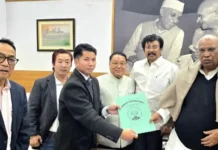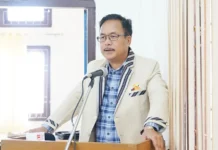[Monday Musing]
[Nellie N Manpoong]
The second wave of the Covid pandemic has woken up the authorities across the country as they are now hastily issuing travel restrictions and calling for Covid-appropriate behaviour advisories and night curfews.
On 7 April, India recorded over 1,25,000 new cases of Covid-19 – more than any other country in the world in 24 hours time, and it continues to beat its own record with each passing day. The country went on to record 1,45,384 new cases on 10 April.
Considering the numbers, countries like New Zealand have taken the wise decision of banning Indian travellers.
The Delhi government, which had started opening the schools, has also abruptly shut them down till further notice. Closer home, Mizoram has also initiated the process of closing schools for students of Class 8 and below.
Reports of the government higher secondary school in Lower Dibang Valley’s Roing being declared as a containment zone and two teachers of the Kendriya Vidyalaya in Roing testing Covid positive can be considered as a sure sign that the virus is back and it would be safe to assume that the Covid standard operating procedures are not being followed well in educational institutes, especially overcrowded government institutions.
Many might argue that only seven of the 153 people who were tested through RAT in the school turned out to be positive. But consider this: the Centre has called for 70 percent of the tests to be the reverse transcription-polymerase chain reaction (RT-PCR) test, and Arunachal has had a negligible 9.6 percent of RT-PCR tests done as of mid-March. This could likely be due to the high price of the RT-PCR tests that costs Rs 1,000, as compared to Rs 250 for the RAT. And while the state government has assured to look into reducing the price, it has been a little over a week since the first assurance came.
Tests apart, skeptics are also now rushing to get vaccinated, but being below 45 years of age is acting as a deterrent.
While the ministry of health and family welfare claims that over 10 crore of the population have been vaccinated as of 11 April, crores are yet to get their second dose.
According to The Economist, “To date, India has dispensed about 90 m doses. It is administering more than 3 m a day. But, experts say that in a country of 1.4 billion this is not fast enough to flatten the curve of infection. That would take more like 10 m a day.”
In the meantime, the central government has announced the ‘vaccination festival’ to be held from 11 to 14 April for people who are 45 years of age or above. This is another attempt to get as many eligible people as possible to get vaccinated within a short span of time. While takers of the vaccine have increased, some are still speculative on the need for a ‘festival’ as they believe it could lead to a mass gathering of people who are vulnerable to the virus.
Blood donors should note that the National Blood Transfusion Council has issued an order that a person cannot donate blood for 28 days after taking the last dose of the Covid-19 vaccine. And since a beneficiary will have to take two shots of the vaccine, they cannot donate for 56 days after taking both the doses.
Some states have also issued advisories to donate blood before getting vaccinated, so that the blood banks do not run dry.
Advisories take me to the Monday Musing my senior colleague wrote last week regarding the usage of masks or the lack thereof while travelling from Arunachal to Assam, and most of us likely did not pay heed to the need to wear one. This week, the administration everywhere – in Arunachal as well as Assam – is issuing new advisories, asking people to wear masks or be slapped with a fine of Rs 500 for non-compliance.
While the measures of the government are appreciable, it certainly cannot afford to relax just yet and wake up only when things get out of hand. Covid-appropriate behaviour should be encouraged and considered part of a healthy lifestyle now instead of a race against time.



